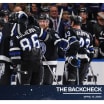On the Lightning's team defense...
The Lightning went 6-2-0 on their recently-completed eight-game homestand and should feel good about their ability to bank 12 of 16 possible points. They rallied from deficits in four of those six wins - in three of those, they trailed in the third period.
Mishkin's Musings: Three thoughts as the playoffs approach
Lightning broadcaster Dave Mishkin offers up his opinions on Tampa Bay's defense and playoff positioning in the Eastern Conference

© Roy K. Miller/Icon Sportswire
But what about the subject of team defense, which has been an area of concern for the Lightning in the second half of the season? Even though they endured some bumpy moments during the homestand, the Lightning are showing signs of tightening up that part of their game. In the final five games of the homestand, the Lightning held the opposition to 30 or fewer shots in four of them. (The one exception was a big outlier - the March 13th game against Ottawa, which was the team's worst defensive game in the entire homestand.)
But let's look at the other four. On March 10th against the Rangers, the Lightning dominated play for the first two periods and built a 5-1 lead. Their third period wasn't sharp (and the Rangers pulled to within 5-3), but the first 40 minutes were excellent.
The 3-0 loss to Boston on March 17th was disappointing - and frustrating. That's because the Lightning had a difficult time generating scoring chances against Boston - and squandered many of their best looks by shooting pucks wide of the Boston net. But the Lightning's five-on-five team defense wasn't bad. Yes, there was a coverage breakdown on the first Bruins goal, but the Lightning didn't allow another even-strength goal the rest of the way. The penalty kill struggled - the Lightning allowed two power play goals and both tallies came shortly after Boston won the offensive zone faceoff to begin the man advantage. On the other hand, the Lightning held the Bruins to just 27 shots for the game and owned most of the puck possession during the night. Ultimately, the Lightning didn't defend quite as well as the Bruins. That, and special teams play, were the difference in the game. But in terms of their own five-on-five team defense, the Lightning did a pretty good job.
The 3-1 victory over Edmonton on March 18 was one of the best defensive performances the Lightning have had in the second half of the season. They held the dangerous Connor McDavid in check and limited the Oilers to just 14 even strength shots. Even though the Oilers have had a tough season, don't discount the value of such a performance. The Oilers had gone 4-1-1 in their previous six games and were coming off an impressive 4-2 comeback win in Sunrise against the Florida Panthers. In the game after their loss to the Lightning, the Oilers clobbered Carolina, 7-3.
Tuesday's game against Toronto was a mixed bag. For a good portion of the first two periods, the Lightning's game was plagued with turnovers and they yielded a high volume of scoring chances. But the final 25 minutes of the game were a different story. Not only did the Lightning rally with four answered goals, they were very crisp in their execution and, as a result, dictated play in all three zones. Also, the penalty kill, which went 5-5 against Edmonton, came up with a critical kill during the third period against the Leafs, preserving what was a 4-3 lead at the time.
So in terms of the Lightning's team defense, there have been a number of positive signs that the club is moving in the right direction.
On the battle for first in the Atlantic Division...
The Lightning currently lead the Boston Bruins by five points for first place in the Atlantic Division. The Bruins have two games in hand and there are two head-to-head contests remaining in the season series. Toronto is still mathematically alive to catch both teams for first place, but it's looking like the winner of the division will either be the Lightning or Bruins. It's sizing up to be an exciting race to the finish.
If the teams are tied at the end of the regular season, who wins the division?Here's a refresher on the tie-breaker rules.The first tie-breaker is regulation/overtime wins, or ROW.If two teams are tied in ROW, then it comes down to points gained in the season series.The third tie-breaker would be goal differential.
The Bruins have won the first two games in the season series (both in regulation) and lead in points, 4-0, so the best the Lightning can hope for is a tie in the season series. It seems likely, however, that if the Lightning do win the final two games in the season series, they will win the division outright. In other words, if the Bruins are going to make up those five points, even with their two games in hand, they're probably going to need to win at least one of those two remaining games against the Lightning. Meaning Boston is poised, in the event of a standings tie at the end of the regular season, to have won the head-to-head season series.
So if the Lightning hope to win the tiebreaker, they're going to need more ROW. That's because a tie in ROW would allow the Bruins to claim the division based on their success in the season series.
With two and a half weeks left in the regular season, neither the Lightning nor Bruins has a clear advantage in ROW. The Lightning have 44 and the Bruins own 42. If the Bruins make up their games in hand with two non shootout wins, the teams would be tied in ROW. So if Lightning fans are scoreboard watching, they should be rooting for Boston losses. If the Bruins do win, it'd be better for the Lightning if some of those wins came in the shootout.
On the Eastern Conference Wild Card race...
The Wild Card race in the East is a close one, but the number of teams competing for the two spots has dwindled in recent weeks. Florida has kept pace, however, meaning that there are nine Eastern teams battling for eight spots. The Lightning, who have clinched a berth, Boston and Toronto are secure. Washington is in first place in the Metropolitan Division and has a 10-point lead on the Panthers. But the other four Metro teams - Pittsburgh, Columbus, Philadelphia and New Jersey - are all within six points of the Panthers. Furthermore, Florida has at least two games in hand on all of those clubs.
Trying to handicap the race is tough, because, as we've seen over the years, there are no automatic wins - or losses - in the NHL. Teams that are out of playoff contention can be effective spoilers. For example, the Panthers recently suffered home losses to Ottawa and Edmonton, two teams that have endured rough seasons.
In terms of head-to-head matchups between these five contending teams, Pittsburgh has four of its nine remaining games left against Columbus, Philly and New Jersey (twice). Florida only has one game left against those other teams - the Panthers play at Columbus tomorrow.


















